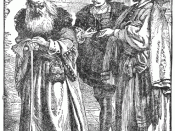The Covenant is the theme of Shakespeare's play, The Merchant of Venice, as well as of the Bible, although the Covenant does not appear to be the theme of the play.
The Covenant does not appear to be the theme of The Merchant of Venice. For example, in the play, Antonio makes a verbal agreement because of his friendship with Bassanio to loan him the money Antonio borrows from Shylock. This verbal, informal agreement is a gesture of friendship; The agreement is not a blessing from a father to son, or similarly, of God to man. Therefore, Antonio and Bassanio's actions do not reflect the Covenant or parallel the books of Genesis. Secondly, Launcelot is a clown and a servant to Shylock. However, in the play, Launcelot wishes to leave Shylock's house and serve Bassanio instead. This action, like Antonio's, also contradicts the thematic ideas of the Covenant of the Bible.
The Covenant in the Bible is essentially a commitment. Launcelot's desire to leave Shylock and forsake his duties to him shows his lack of commitment and thus does not parallel the Covenant. Lastly, and possibly the most contradictory of the theme of the Covenant, is Shylock's daugher, Jessica's, actions. Jessica leaves her father to marry Lorenzo. She does not ask for her father's blessing and leaves the house covertly. Through this, the theme of the Covenant is negated.
In spite of the previous reasons the Covenant is not the theme of the play, there is more evidence in the text that supports that the Covenant is, in fact, the theme of the play. The Covenant has a great deal to do with Shylock who, in Act One, Scene Three, lines 68-71, implies a parallel between himself and Jacob in Chapters Thirty, Thirty-one, and Twenty-seven of...


